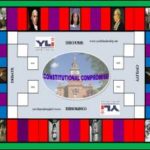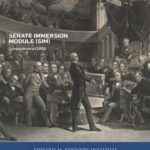This lesson examines the process of local decision making and its need for citizen input and compromise. Students simulate a local city/county council session and advise the council on public policy. Students are asked to consider the viewpoints of different citizen groups in order to reach a compromise that will benefit the entire community. This lesson can be used with a unit on local politics and can be adapted to reflect issues of compromise in your school or community. Free registration required to access the lesson plan.
Birth of American Democracy: Discourse, Debate and Compromise
In this exploration of American democracy students will follow the path to representative government by analyzing the tradition of discourse, debate, and compromise from Jamestown to Williamsburg and Philadelphia and finally to Washington. Students will determine the importance of debate and compromise for the development of a government by and for the people and also identify strategies for making their voices heard in government today. Free registration required to access lesson plan.
Compromise at the Constitutional Convention
This activity is designed to help students understand the debates at the Constitutional Convention in 1787 that shaped America’s legislative branch of government. The primary goal is for students to discover how a compromise balanced the needs of large states and small states and how this led to the
creation of the current House of Representatives and Senate. In contrast to the real convention, this activity is simplified and focused to come to a conclusion in a class period.
Act II: What Was the Connecticut Compromise at the Constitutional Convention?

This short video explores the Connecticut Compromise, in which the delegates rejected an “either/or” solution to the question of representation and instead “thought out of the box,” creating a government that was partly national and partly federal. Professor Gordon Lloyd points out that although the final vote (5/4/1) on the Compromise did not reflect a bi-partisan consensus, it nevertheless was a significant breakthrough for moving on to other issues.
Constitutional Compromise Game

The Constitutional Compromise Game was designed specifically for teachers who don’t know what to do on Constitution Day. The game combines the skills of discourse, debate and compromise that were essential to the creation of the Constitution. Students work independently and in groups to solve Constitutional challenges and ratify the Constitution. This is a great activity for teachers who do not teach government or civics but need to satisfy the Constitution Day requirement. Free registration is required to access the lesson plan.
Slavery: No Freedom, No Rights (Lesson Plan)
Examine the history of slavery in the United States. Trace the development and expansion of slavery in the 19th century and learn about the conflicts and compromises that occurred prior to the Civil War and the abolition of slavery.
From the basics about slavery to the attitudes that defended it and the efforts of those who wanted to see it abolished, in this lesson students learn about this dark part of America’s past.
** Please note: The section about the Missouri Compromise and the Compromise of 1850 has been moved to a new mini-lesson called Slave States, Free States that explores the debate about the expansion of slavery. We recommend teaching this mini-lesson along with the Slavery lesson. Find it in our Geography Library.
The Influence of the Declaration of Independence on the Constitution
In this lesson, students will use C-SPAN video clips to examine the founding principles that emerged from the Constitutional Convention as well as hear about some of the people who participated. Students will use this information to analyze the role the compromise played in the creation of the Constitution.
The Constitutional Convention
In this lesson, students will use C-SPAN video clips to examine the founding principles that emerged from the Constitutional Convention as well as hear about some of the people who participated. Students will use this information to analyze the role the compromise played in the creation of the Constitution.
The Constitutional Convention of 1787
In this unit, students will examine the roles that key American founders played in creating the Constitution, and the challenges they faced in the process. They will learn why many Americans in the 1780s believed that reforms to the Articles of Confederation were necessary, and the steps taken to authorize the 1787 Convention in Philadelphia. They will become familiar with the main issues that divided delegates at the Convention, particularly the questions of representation in Congress and the office of the presidency. Finally, they will see how a spirit of compromise, in the end, was necessary for the Convention to fulfill its task of improving the American political system.
Compromise of 1850 (SIM Lesson Plans)

The materials in this curriculum are designed to enhance the Institute’s Senate Immersion Module (SIM) experience, but can also be used separately. The SIM program is an educational, role-playing experience, developed to engage new generations of Americans. The Institute encourages classroom preparation for the SIM, active play at the Institute, and debriefing at the end of the experience.